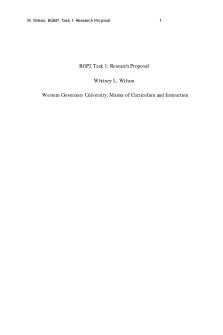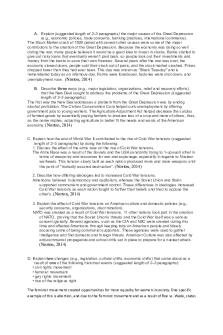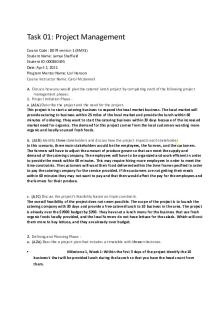Task2 - Task 2: Passed PDF

| Title | Task2 - Task 2: Passed |
|---|---|
| Author | Alexa Labozan |
| Course | Introduction to Curriculum Theory |
| Institution | Western Governors University |
| Pages | 3 |
| File Size | 73.4 KB |
| File Type | |
| Total Downloads | 100 |
| Total Views | 155 |
Summary
Task 2: Passed...
Description
1 WGU TASK TWO
WGU, Introduction to Curriculum Theories. Alexa Labozan Western Governors University
2 WGU TASK TWO Potential Challenges. There are many different challenges that can, and do come up as I strive to develop an instructional setting that best reflects my personal philosophy. One challenge is meeting the needs of the diverse students I teach, and ensuring they meet the standards needed to move forward. Within my classroom, I have students who are Gifted & Talented, English Language Learners, and Twice Exceptional. I have students from different countries & cultures, all with their own experiences to bring to the classroom. This poses a challenge when teaching, due to the unique needs of my students. When teaching, my gifted & talented students need to be challenged and pushed to think outside the box, while my English Language Learners need direct teacher support to ensure they’re able to understand what’s been taught. Oftentimes I need to plan ahead to ensure I can meet the specific needs of all students. It is important that students are correctly challenged or helped depending on their needs. In the classroom, it is important that lessons are varied so that I am able to meet the needs of all students. I cannot focus on one method or style to ensure learning. For example, students are not expected to solely read chapters from a textbook, listen to lectures, and copy notes for all subjects taught. They’re also not expected to solely learn completely at their own pace, depending on what interests them. To teach this way would leave gaps for many of my students. Therefore, it is my role as the teacher, to ensure all student’s needs are met while incorporating a variety of curriculum ideologies. Personal Philosophy of Curriculum. I believe that by incorporating different curriculum theories, I would best be able to teach students of all abilities. It is important that I generate a classroom that balances the ideologies of scholar academic learning, social efficiency, and learner centered learning. By incorporating all three, students of all ability levels are able to thrive. With each lesson, there is a strong focus on student’s learning specific knowledge and developing certain skills. It is important that lessons are centered around these two ideologies. This gives each lesson an academic focus and a central skill for all students to learn. Students are expected to learn specific information that I have determined is important for the discipline. I am able to teach the information through lecture and text, and students are able to receive the information. Students are able to think and build on the knowledge taught, and they are able to relate and connect it to the skill needed for adulthood. The skill is demonstrated for students throughout the lesson, and they are able to practice the skill themselves. While students practice the skills being taught, I am able to meet with students, fostering a teacher-student relationship. It is crucial to ask questions that prompt thinking and provide feedback. This also allows for me to meet different student’s needs. I can adjust my wording and questioning for each student to best meet their interests and developmental levels. For example, my gifted and talented students would be prompted with higher order questions. These questions might challenge them to think beyond the classroom, making connections to the world outside the classroom. With my ELL students, I am able to ask them connection questions. Whether it’s done by drawing from their own culture or past experiences, they are able to make a connection that prompts their learning and understanding. It is also important that I allow time for students to explore their own interests. This allows for students to demonstrate their understanding and knowledge in a way that is best for them. Within the lesson, students are given a skill and topic to focus on. But by giving students time to work independently, they have the ability to explore that focus in their own way. By incorporating this principle of the learner
3 WGU TASK TWO centered ideology, students have a chance to continue learning in a way that feeds student’s interests. This gives students the ability to explore their own passions within the interest and it allows for students to work at their own level. I am able to set the standard and expectation for the general subject and skill, but students can demonstrate their mastery in their own way. Curriculum Ideology. One specific ideology that is crucial to incorporate is the learner centered ideology. This ideology in particular, allows for any students with exceptional needs to learn in a way that best suits them. It allows for students to take control of their learning and love what they learn. What is important is being able to meet diverse student needs. Oftentimes there is a range of students in the classroom. There are students who are more advanced than others and it’s important to ensure all students feel successful. The learner centered ideology in particular, allows for students to learn at their own pace, and they are able to develop their skills on their own. A key concept within the learner centered ideology, is allowing students to follow their own interests at that time. Students are able to explore these interests in a variety of ways. This can be incredibly beneficial to Gifted & Talented students, as well as English Language Learners. Oftentimes, these two types of students have different interests and ability levels. By offering the opportunity for self-learning, all students can challenge themselves in a way that best suits them. In my classroom, English Language Learners often times speak two, sometimes three, languages. They enter the classroom having only spoken English at school. This poses a challenge for students because often times their conversational English is not as well developed. Students are oftentimes challenged with academic vocabulary and using that vocabulary in context. Reading, writing, social studies, and science can be incredibly challenging. By allowing time for student led learning, these students are given a chance to follow their interests and focus on that. They are able to grow independently in a way that best suits them. By incorporating the learner centered ideology, student success isn’t measured by a standard test or assessment. Rather, students are assessed on what and how they’ve learned for themselves. Student growth is measured through conversations, interactions, and observations in the classroom. This allows for growth in not only knowledge, but confidence as well. At the same time, student led learning allows Gifted and Talented students the opportunity to think outside the box, and push their thinking past what’s been taught. Oftentimes Gifted & Talented students strive to make connections and they’re eager to challenge themselves to think in different ways. These students can benefit in many ways from self-led learning. They are able to follow their passions and interests in a way that best suits them. For example, if learning about the scientific method, they may want to put the steps of the scientific method into place with an experiment they design. Instead of limiting these students to the teacher led experiment, they can take them time to think through the steps and apply those steps to a problem they would like to solve. One student may want to solve the problem of food waste that happens at school or they might want to see what food source best helps butterflies grow. They can take a problem or question that they are excited by, and they have the ability to use that when applying knowledge. The learner centered ideology allows all students needs to be met in a way that is best for them. All students are able to feel successful and they can do so in a way that’s best for them. There is no one size fits all with learning, and concepts of the learner centered ideology allow for students of all ability levels to learn and grow....
Similar Free PDFs

Task2 - Task 2: Passed
- 3 Pages

LR Task2 - Task 2
- 30 Pages

C225 Task 2 (passed)
- 8 Pages

Passed C840 Task2 v2.1 - Copy
- 29 Pages

C200 Task 2 - Passed
- 13 Pages

C206 Task 2 - Task 2 passed
- 9 Pages

D092 Task 2 passed assignment
- 3 Pages

C227 Task 1 - Passed Task
- 22 Pages

C121 Task2 - Task 2 WGU C121
- 17 Pages

TAT2 Task 1: Passed
- 14 Pages

D082 Task 1- PASSED
- 2 Pages

History task 4 - PAssed
- 2 Pages

Task 1 D091 done - Passed
- 6 Pages

C206 Task 1 V2 - Task 1 Passed.
- 11 Pages
Popular Institutions
- Tinajero National High School - Annex
- Politeknik Caltex Riau
- Yokohama City University
- SGT University
- University of Al-Qadisiyah
- Divine Word College of Vigan
- Techniek College Rotterdam
- Universidade de Santiago
- Universiti Teknologi MARA Cawangan Johor Kampus Pasir Gudang
- Poltekkes Kemenkes Yogyakarta
- Baguio City National High School
- Colegio san marcos
- preparatoria uno
- Centro de Bachillerato Tecnológico Industrial y de Servicios No. 107
- Dalian Maritime University
- Quang Trung Secondary School
- Colegio Tecnológico en Informática
- Corporación Regional de Educación Superior
- Grupo CEDVA
- Dar Al Uloom University
- Centro de Estudios Preuniversitarios de la Universidad Nacional de Ingeniería
- 上智大学
- Aakash International School, Nuna Majara
- San Felipe Neri Catholic School
- Kang Chiao International School - New Taipei City
- Misamis Occidental National High School
- Institución Educativa Escuela Normal Juan Ladrilleros
- Kolehiyo ng Pantukan
- Batanes State College
- Instituto Continental
- Sekolah Menengah Kejuruan Kesehatan Kaltara (Tarakan)
- Colegio de La Inmaculada Concepcion - Cebu

